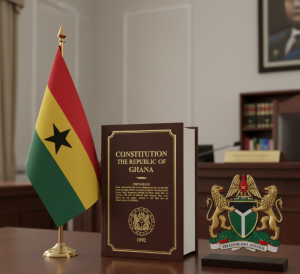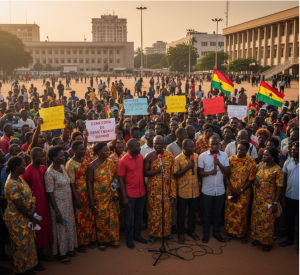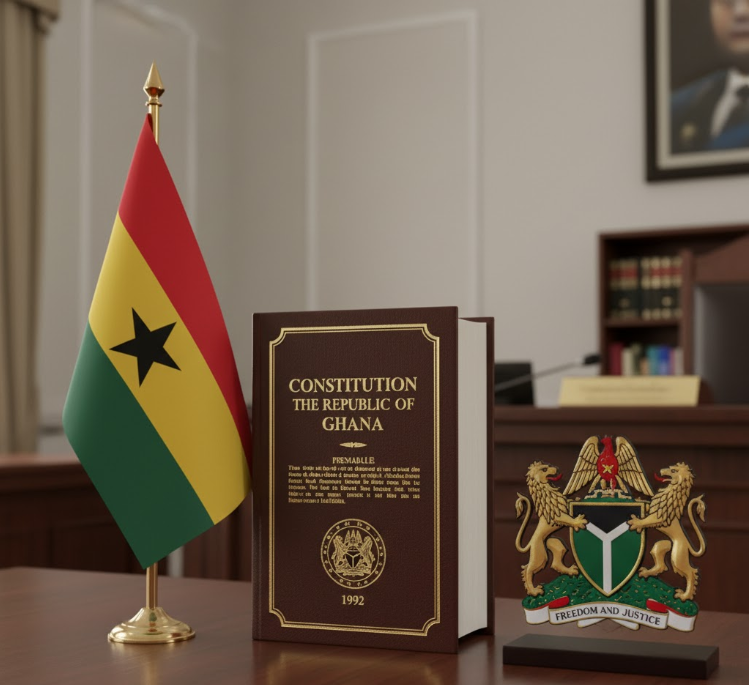I still remember April 28, 1992. I was just a kid, but the excitement in our house was electric. My father, who had lived through four different constitutions and multiple military coups, kept saying, “This one is different. This one will last.” He was right. Over three decades later, the 1992 Constitution remains Ghana’s supreme law, the foundation of our Fourth Republic, and the guardian of our democratic freedoms.
Here’s what makes understanding the key facts about Ghana’s 1992 Constitution so important: this document isn’t just legal jargon locked away in government archives. It’s the rulebook for how our country operates, the shield protecting your rights, and the framework ensuring no one, not even the President, is above the law. When 92% of Ghanaians voted “yes” in that 1992 referendum, they were choosing democracy, freedom, and the rule of law.
Whether you’re a student studying civics, a citizen wanting to understand your rights, or someone curious about how Ghana’s democracy works, these key facts about Ghana’s 1992 Constitution will give you everything you need to know about the document that shapes our nation.
The Birth of Ghana’s Fourth Republic
The Constitution was approved on April 28, 1992, through a national referendum after 92% support, officially coming into force on January 7, 1993, when the Fourth Republic’s first government was sworn in. This overwhelming support wasn’t accidental. Ghanaians had endured decades of instability and were ready for lasting democracy.
The 1992 Constitution was based upon the democratic principles established by the 1957, 1969, and 1979 Constitutions, plus input from a 258-member Committee of Experts who submitted constitutional proposals that would be approved by the Consultative Assembly. This wasn’t a document created in a vacuum; it learned from Ghana’s painful history of coups and dictatorships.

Constitutional Supremacy: The Foundation
This Constitution shall be the supreme law of Ghana and any other law found to be inconsistent with any provision of this Constitution shall, to the extent of the inconsistency, be void. This is Article 1, and it’s arguably the most important sentence in the entire document.
What does this mean practically? No law passed by Parliament, no executive order by the President, no court ruling can contradict the Constitution. If it does, that law, order, or ruling is automatically void. The Sovereignty of Ghana resides in the people of Ghana in whose name and for whose welfare the powers of government are to be exercised in the manner and within the limits laid down in this Constitution.
Structure: 26 Chapters of Governance
The Constitution is made up of 26 chapters, not including the preamble. Here’s how they’re organized:
Chapter 1: The Constitution (Supremacy and Enforcement) Chapter 2: Territories of Ghana Chapter 3: Citizenship Chapter 4: The Laws of Ghana Chapter 5: Fundamental Human Rights and Freedoms Chapter 6: The Directive Principles of State Policy Chapter 7: Representation of the People Chapters 8-10: The Executive, Legislature, and Judiciary Chapters 11-26: Various institutions, commissions, and administrative provisions
This structure reflects the Constitution’s comprehensive approach to governance, covering everything from citizenship rights to chieftaincy institutions, from emergency powers to public finances.
Fundamental Human Rights and Freedoms: Your Shield
Chapter 5 is the heart of the Constitution for ordinary citizens. The fundamental human rights and freedoms enshrined in this Chapter shall be respected and upheld by the Executive, Legislature and Judiciary and all other organs of government and its agencies and, where applicable to them, by all natural and legal persons in Ghana, and shall be enforceable by the courts
Rights Protected Under the Constitution
Right to Life (Article 13): Protection against arbitrary deprivation of life.
Personal Liberty (Article 14): No one can be arrested or detained except under law, with detailed provisions for fair treatment of arrested persons.
Human Dignity (Article 15): The dignity of all persons shall be inviolable, protecting against torture, cruel, inhuman, or degrading treatment.
Freedom from Slavery and Forced Labour (Article 16): Absolute prohibition against slavery, servitude, and forced labor.
Equality and Non-Discrimination (Article 17): Every person in Ghana, whatever his race, place of origin, political opinion, colour, religion, creed or gender shall be entitled to the fundamental human rights and freedoms
Privacy (Article 18): Protection of home, property, correspondence, and communication from interference.
Fair Trial (Article 19): An adjudicating authority for the determination of the existence or extent of a civil right or obligation shall, subject to the provisions of this Constitution, be established by law and shall be independent and impartial
Property Rights (Article 20): Protection from arbitrary deprivation of property.
General Fundamental Freedoms (Article 21): This comprehensive article guarantees:
- Freedom of speech and expression
- Freedom of thought, conscience, and belief
- Freedom to practice any religion
- Freedom of assembly
- Freedom of association, which shall include freedom to form or join trade unions or other associations, national and international, for the protection of their interest
- Information, subject to such qualifications and laws as are necessary in a democratic society
- Freedom of movement which means the right to move freely in Ghana, the right to leave and to enter Ghana and immunity from expulsion from Ghana
How Rights Are Enforced
Where a person alleges that a provision of this Constitution on the fundamental human rights and freedoms has been, or is being or is likely to be contravened in relation to him, then, without prejudice to any other action that is lawfully available, that person may apply to the High Court for redress
The High Court has power to issue writs including habeas corpus (for unlawful detention), certiorari, mandamus, prohibition, and quo warranto. This gives ordinary Ghanaians real power to challenge rights violations.
Special Protections: Women, Children, and Vulnerable Groups
The Constitution dedicates specific provisions to protecting vulnerable populations.
Women’s Rights
Special care shall be accorded to mothers during a reasonable period before and after child-birth; and during those periods, working mothers shall be accorded paid leave
Women shall be guaranteed equal rights to training and promotion without any impediments from any person
Children’s Rights
The Constitution provides comprehensive protections for children, including:
- Every child, whether or not born in wedlock, shall be entitled to reasonable provision out of the estate of the parent
- Right to education and health care
- Protection from harmful work
- No child shall be deprived by any other person of medical treatment, education or any other social or economic benefit by reason only of religious or other beliefs
Persons with Disabilities
The Constitution requires the State to protect disabled persons from discrimination and ensure their full participation in society.
Government Structure: Checks and Balances
The 1992 constitution, as the supreme law of the land, provides for the sharing of powers among a president, a parliament, a cabinet, a Council of State, and an independent judiciary. Through its system of checks and balances, it avoids bestowing preponderant power on any specific branch of government
Executive Branch
The President serves as head of state, head of government, and commander in chief, elected for four-year terms with a maximum of two terms. The President appoints the Vice President and cabinet, with more than half of ministers required to come from Parliament.
Legislative Branch
Parliament is unicameral with members directly elected for four-year terms. Parliamentary and presidential elections occur simultaneously.
Judicial Branch
The structure and the power of the judiciary are independent of all other branches of government. The Supreme Court has broad powers of judicial review; it rules on the constitutionality of any legislative or executive action at the request of any aggrieved citizen
Emergency Powers: Safeguards Against Abuse
The President may, acting in accordance with the advice of the Council of State, by Proclamation published in the Gazette, declare that a state of emergency exists in Ghana or in any part of Ghana
However, critical safeguards exist:
- The President shall place immediately before Parliament, the facts and circumstances leading to the declaration of the state of emergency
- Parliament shall, within seventy-two hours after being so notified, decide whether the proclamation should remain in force or should be revoked
This prevents presidents from using emergency powers to establish dictatorships, a lesson learned from Ghana’s past.
Citizenship: Who Is Ghanaian?
The Constitution establishes clear citizenship rules:
- Citizenship by birth (at least one parent is Ghanaian)
- Citizenship by registration (under specified conditions)
- Dual citizenship is permitted (amended in 2000)
Article 8 now allows Ghanaians to hold citizenship of other countries without losing Ghanaian citizenship, recognizing the reality of Ghana’s diaspora.
Chieftaincy: Traditional Authority Protected
The 1992 constitution, like previous constitutions, guarantees the institution of chieftaincy together with its traditional councils as established by customary law and usage
This recognition balances modern democratic governance with Ghana’s rich traditional systems, ensuring chiefs retain their cultural and ceremonial roles while democratic institutions handle governmental functions.
Constitutional Amendments: Not Easy, By Design
The Constitution contains “entrenched provisions” that are deliberately difficult to amend, including:
- The Constitution itself (Chapter 1)
- Citizenship (Chapter 3)
- Fundamental Human Rights and Freedoms: Chapter 5
- Representation of the People (Chapter 7)
- The Presidency and Parliament (Chapters 8 and 10)
Amending these requires:
- At least 40% voter turnout in a national referendum
- At least 75% “yes” votes from those voting
Other provisions can be amended by two-thirds parliamentary vote. This ensures fundamental rights can’t be easily stripped away.
Key Constitutional Provisions Summary
| Provision | Key Fact |
|---|---|
| Supremacy | Constitution is supreme law; conflicting laws are void |
| Structure | 26 chapters plus preamble |
| Rights Enforcement | Citizens can challenge violations in High Court |
| Presidential Term | 4 years, maximum 2 terms |
| Emergency Powers | Parliament must approve within 72 hours |
| Judicial Independence | Judiciary completely independent from Executive and Legislature |
| Dual Citizenship | Permitted since 2000 amendment |
| Amendment Threshold | Entrenched provisions require referendum with 75% approval |
| Chieftaincy | Traditional institutions protected |
| Gender Equality | Special protections for women, children, vulnerable groups |
Citizen Duties: Rights Come with Responsibilities
While the Constitution guarantees rights, Article 41 urges duties on individual Ghanaian citizens, stating that the exercise of rights and freedoms, guaranteed in the Constitution, are inseparable from the citizen’s performance of their duties
These duties encompass civil, political, economic, social, and cultural practices, including:
- Upholding and defending the Constitution
- Fostering national unity
- Protecting public property
- Contributing to community development
- Respecting the rights and freedoms of others
Why These Facts Matter
Understanding these key facts about Ghana’s 1992 Constitution empowers you as a citizen. When you know your rights, you can defend them. When you understand government structure, you can hold leaders accountable. When you recognize the Constitution’s supremacy, you understand that no one is above the law.
The 1992 Constitution transformed Ghana from a country plagued by coups into one of Africa’s most stable democracies. It’s not perfect, but it provides the framework for continuous improvement through democratic processes rather than military intervention.
Have you ever had to rely on your constitutional rights? Do you think the Constitution adequately protects all Ghanaians? Share your thoughts in the comments below, and if you found these key facts about Ghana’s 1992 Constitution helpful, share this article with someone who needs to understand the foundation of our democracy.
Frequently Asked Questions About Ghana’s 1992 Constitution
When was Ghana’s 1992 Constitution approved and when did it take effect?
Ghana’s 1992 Constitution was approved on April 28, 1992, through a national referendum with 92% support from Ghanaian voters. The Constitution officially came into force on January 7, 1993, when the Fourth Republic’s first government was sworn in. This marked Ghana’s transition from military rule to constitutional democracy, establishing the framework that governs Ghana to this day with only minor amendments.
What fundamental rights does Ghana’s Constitution guarantee?
Ghana’s Constitution guarantees comprehensive fundamental rights including right to life, personal liberty, human dignity, freedom from slavery and forced labor, equality and non-discrimination, privacy, fair trial, property rights, freedom of speech and expression, freedom of religion, freedom of assembly and association, freedom of movement, and access to information. These rights are enforceable by courts, meaning citizens can challenge violations through the legal system.
How can I enforce my constitutional rights if they’re violated?
If your constitutional rights are violated, you can apply to the High Court for redress under Article 33. The High Court can issue various writs including habeas corpus (for unlawful detention), certiorari, mandamus, prohibition, and quo warranto to enforce your rights. You have the right to appeal High Court decisions to the Court of Appeal, with further appeal to the Supreme Court. This system ensures multiple levels of protection for your fundamental rights and freedoms.
Can Ghana’s Constitution be changed or amended?
Yes, but certain provisions called “entrenched provisions” are deliberately difficult to amend. These include the Constitution itself, citizenship rules, fundamental human rights and freedoms, representation of the people, and the presidency and Parliament. Amending these requires a national referendum with at least 40% voter turnout and at least 75% approval from those voting. Other provisions can be amended by two-thirds parliamentary vote. This protects fundamental democratic principles from easy manipulation.
What makes Ghana’s 1992 Constitution different from previous ones?
Ghana’s 1992 Constitution learned from previous failures, incorporating stronger protections against military coups and dictatorship. It established clear power-sharing among Executive, Legislature, and independent Judiciary with robust checks and balances. The Constitution provides greater freedom of press and human rights guarantees, reinforces unitary government while allowing local governments, requires presidential term limits (maximum two four-year terms), and ensures judicial independence with broad powers of judicial review. These features have contributed to over 30 years of stable democratic governance.
Sources:
- Ghana’s Constitution of 1992 with Amendments through 1996 (Official Text) – Complete constitutional text with all provisions and amendments
- Ghana Judicial Service – Fundamental Human Rights and Freedom – Official government source on constitutional rights
- UN Women – Constitution of Ghana Analysis – Comprehensive analysis of constitutional provisions affecting rights and governance
